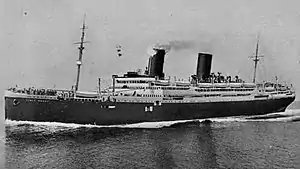 Conte Rosso | |
| History | |
|---|---|
| Name | Conte Rosso |
| Namesake | Amadeus VII, Count of Savoy |
| Owner |
|
| Port of registry |
|
| Builder | William Beardmore & Co, Dalmuir |
| Yard number | 611 |
| Launched | 10 February 1921 |
| Completed | 14 March 1922 |
| Maiden voyage | 17 May 1922 |
| Identification |
|
| Fate | Sunk 24 May 1941 |
| General characteristics | |
| Type | Ocean liner |
| Tonnage | 18,500 GRT |
| Length | |
| Beam | 22.5 m (73 ft 10 in) |
| Draught | 9.1 m (30 ft) |
| Depth | 10.9 m (35.9 ft) |
| Installed power |
|
| Propulsion |
|
| Speed | 21 knots (39 km/h) |
| Capacity |
|
| Notes | sister ship: Conte Verde |
SS Conte Rosso was an Italian transatlantic ocean liner that was built in Scotland in 1921–22, became a troop ship in the 1930s and was sunk by HMS Upholder in 1941.
She was named after Amadeus VII, Count of Savoy, the so-called "Red Count", and was noted for her lavish Italian interior decoration. Because much of its sailing would be in warmer waters, the designers included an outdoor dining area, unusual for ships of this era.
Conte Rosso had a sister ship, Conte Verde.
Building
William Beardmore and Company built the ship in Dalmuir, Glasgow for the Italian Lloyd Sabaudo Line. She was launched on 10 February 1921 and completed on 14 March 1922.[1]
Conte Rosso was 173.8 m (570.2 ft) long between perpendiculars, had a beam of 22.5 m (74 ft) and her gross register tonnage was 17,857. She had four steam turbines driving two screws by double reduction gearing.[2]
Conte Rosso's code letters were NJVH[2] until they were superseded in 1934 by the maritime call sign IBEI.[3]
Service history
She entered service in 1922 carrying passengers between Italy and New York City. She was the first new transatlantic liner built after World War I and the largest Italian liner to date.
In 1928 she was replaced on the New York route by the newer Conte Grande and began service between Italy and South America.[4]
In 1932 Lloyd Sabaudo merged with Navigazione Generale Italiana and Cosulich Line to form Flotte Riunite. Flotte Riunite transferred Conte Rosso to the Trieste – Bombay – Shanghai route. After 1933 this became one of the major escape routes for the Jewish population of Germany and Austria as Shanghai was one of the few places that did not require paid emigration visas.
Conte Rosso served as an Italian troop ship during the Second Italo-Ethiopian War in the 1930s.
Incidents
On 31 January 1925, 19-year-old Antonietta Gigliobianco mysteriously fell overboard from Conte Rosso to her death, orphaning her two-year-old son Ernesto. After he was turned over to the ship's chaplain, a media outcry in New York City ensued, which reunited the boy with his father Leonardo Gigliobianco.
Sinking
In World War II the Italian Government again used Conte Rosso as a troop ship. On 24 May 1941 the Royal Navy submarine HMS Upholder sank her by torpedo 16 km (9 nautical miles) off the coast of Sicily while in convoy from Naples to Tripoli. Of the 2,729 soldiers and crew aboard, 1,297 were killed.
See also
References
- ↑ "Conte Rosso (5605814)". Miramar Ship Index. Retrieved 18 October 2020.
- 1 2 Lloyd's Register, Steamers & Motorships (PDF). London: Lloyd's Register. 1930. Retrieved 18 October 2020.
- ↑ Lloyd's Register, Steamers & Motorships (PDF). London: Lloyd's Register. 1934. Retrieved 18 October 2020.
- ↑ The New York Times
Bibliography
- Allaway, Jim (2004). "Chapter 17: The Sinking of the Conte Rosso". Hero of the Upholder. Penzance: Periscope Publishing Ltd. pp. 103–107. ISBN 978-1-904381-23-5.
External links
- Swiggum, Susan; Kohli, Marjorie (8 April 2006). "Lloyd Sabaudo". The ShipsList. Retrieved 11 November 2007.
- Cortesi, Arnaldo (8 January 1936). "Crack Alpine Unit Rushed To Africa". The New York Times. Retrieved 11 November 2007.
- "Conte Rosso Sunk in Transport Duty". The New York Times. 31 May 1941. Retrieved 11 November 2007.
- "Italy's Newest Liner a Model of Luxury" (PDF). The New York Times. 19 February 1922. Retrieved 11 November 2007.
- "Luxury in Italian Ship" (PDF). The New York Times. 15 February 1922. Retrieved 11 November 2007.
- "New Italian Liner Here on First Trip" (PDF). The New York Times. 27 May 1922. Retrieved 8 November 2007.
- "In Memoria Del Piroscafo "Conte Rosso"". Notiziario della Marina (in Italian). XXXI (7). July 1984. Retrieved 11 November 2007.
- "New Italian Liner to be Here Feb. 24" (PDF). The New York Times. 12 January 1922. Retrieved 11 November 2007.
- "Report Americans Shun Second Class". The New York Times. 15 June 1932. Retrieved 11 November 2007.